ASEAN on track for sustainable recovery post-COVID
The economy was discussed at the “Recovery and Resilience: Spotlight on Asean Business” forum by Bloomberg on September 12 in Singapore. As presenting sponsor of the forum, Standard Chartered Bank joined panellists in a conversation with industry leaders and policymakers to discuss emerging opportunities in the region.
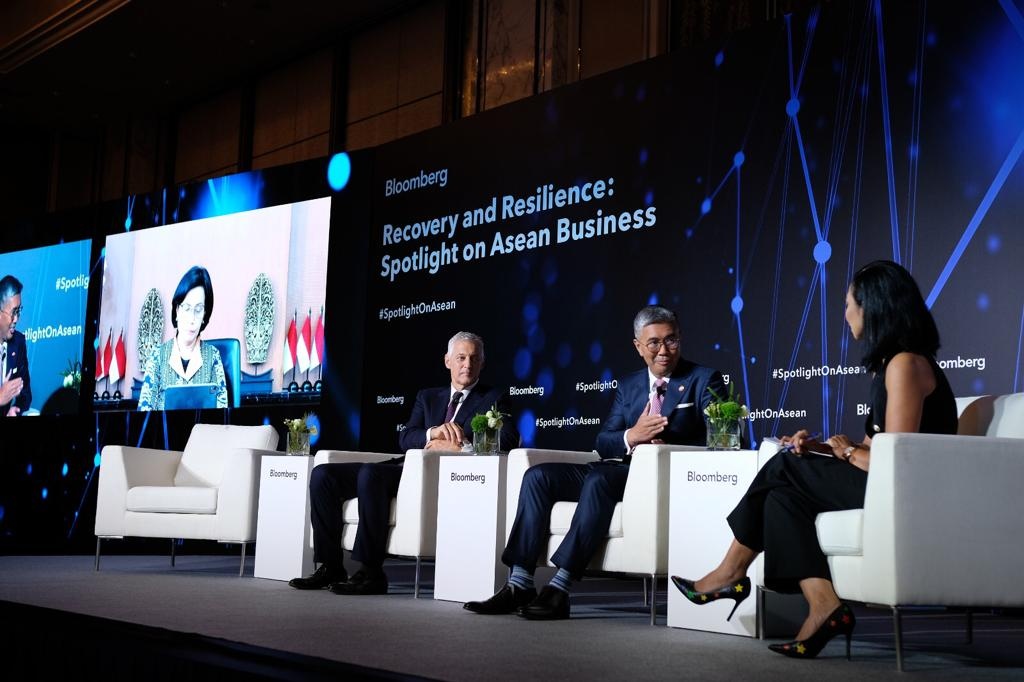 |
The agenda kicked off with an opening address by Benjamin Hung, Standard Chartered's CEO for Asia, where he reinforced ASEAN opportunities resulting from transformational structural trends, including the growing inter-connectivity and digital economy in Asia, and acceleration of the green transition.
He said that ASEAN was an oasis of growth within Asia, with abundant opportunities. ASEAN offers immense growth potential and is a powerful economic catalyst for the global economy.
The region’s track record has been strong over the past 50 years. It is also on track to become one of the world’s largest trading blocs, benefiting from global supply chain shifts with the Regional Comprehensive Economic Partnership (RCEP), which covers approximately 30 per cent of the world’s GDP, facilitating greater open trade and investment flows.
“Capturing ASEAN’s full potential will require active public-private collaboration to bring synergies and break barriers – where we believe greater connectivity and integration will support our collective goal of achieving sustainable, resilient and inclusive growth going forward,” he said.
The forum commenced with a fireside chat on how the public and private sectors can realise ASEAN’s potential amid a challenging macro backdrop, including geopolitical turbulence, a looming climate crisis and infrastructure gaps. The discussion covered global inflation, sustainable finance in the post-COVID world and ASEAN’s economic outlook.
Bill Winters, group chief executive of Standard Chartered, said: “We start by having a very meaningful presence in every ASEAN country, and in most cases for over a century. Combining that with a strong business in Greater China, an integral trade corridor through to the US and Europe will be particularly important.”
At the same time, from a business perspective, challenges remain that could stop ASEAN from realising its potential, including economic integration such as trading and currency arrangements across the region. However, a huge opportunity exists to create a stronger regional market, particularly in sustainable finance.
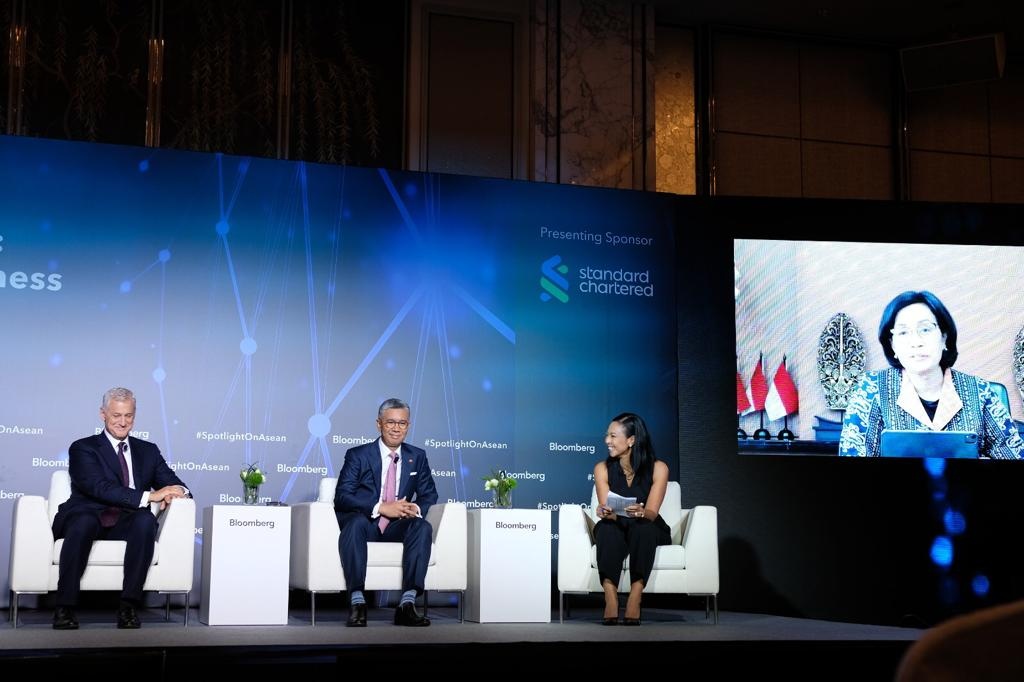 |
“There is strong public-private partnership that could set new models for development, making ASEAN a truly global hub for sustainable finance and carbon markets. I am excited to reflect on the progress we have made over the past decades to get to where we are now,” he said.
On Malaysia’s economic priorities, Tengku Zafrul Aziz, Malaysia's Minister of Finance, stated that 2022 had been a challenging year with the strengthening of the US dollar and slowing of the global economy, but the country was on track to surpass its GDP forecast.
Subsidies have helped maintain Malaysia’s inflation rate, and the country being a net exporter of commodities such as palm oil and part of an integrated supply chain of electrical and electronic products manufacturing has helped its economy.
In its 2023 budget, the government’s priorities will be on people, business, and the economy, maintaining economic growth, ensuring sustainable and inclusive growth, and fiscal responsibility.
Minister Aziz also highlighted the importance of the government’s role in ensuring the transition towards greener and ESG (environment-society-governance) - compliant business practices, in addition to fiscal intervention. In Malaysia, the government is also working with industry stakeholders to reach the country’s net-zero ambitions by 2050, and its stock exchange will launch a Voluntary Carbon Market initiative by the end of this year.
Sri Mulyani Indrawati, Indonesia's Minister of Finance, said that while the pressure from rising prices was severe, August’s inflation rate reduced to 4.6 per cent from 4.9 per cent in the previous month. But underlying core demand-driven inflation was at 3 per cent.
The Indonesian government will further evaluate measures to contain inflation and help the country get through this period by focusing on three main themes: maintaining economic recovery, protecting purchasing power by limiting fuel price adjustments, and ensuring that the country’s budget is credible and sustainable in the medium term.
Minister Indrawati continues to be optimistic about the country's outlook and the stability of Indonesia's rupiah against the US dollar.
She reinforced that Indonesia’s fundamentals remained strong, with the country’s reserves at a record high, the trade account being in surplus for the last 27 months, and foreign direct investment (FDI) inflows staying strong.
In addition, Indonesia plans to boost FDI by improving the ease of doing business, investment infrastructure and human capital.
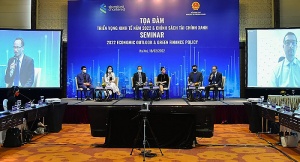 | Standard Chartered predicts strong recovery of Vietnam's economy Vietnam's economy is said to recover strongly from the end of the first quarter. GDP growth is expected to be 6.7 per cent in the year, and 7 per cent in 2023, according to Standard Chartered Bank. |
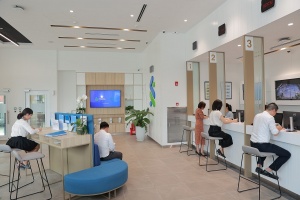 | Standard Chartered Bank forecasts Vietnam’s Q3 GDP growth at 10.8 per cent Standard Chartered Bank forecasts Vietnam’s GDP growth for Q3 and Q4 at 10.8 per cent and 3.9 per cent, respectively, taking full-year growth to 6.7 per cent. High global oil prices may have negative consequences on the economy. |
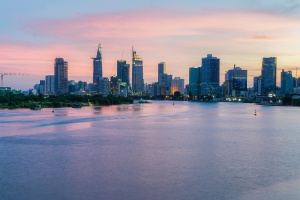 | Standard Chartered expects Vietnam’s recovery to stay strong in August In its latest Global Research report on Vietnam, Standard Chartered Bank anticipates Vietnam’s economy to see a continued recovery in August, as the economic revival has shown signs of broadening. |
What the stars mean:
★ Poor ★ ★ Promising ★★★ Good ★★★★ Very good ★★★★★ Exceptional
 Tag:
Tag:
Related Contents
Latest News
More News
- Spring Fair 2026 boosts domestic demand (March 02, 2026 | 16:30)
- Law on Investment takes effect (March 02, 2026 | 16:21)
- Ho Chi Minh City attracts nearly $980 million in FDI in early 2026 (March 02, 2026 | 10:57)
- Businesses bouncing back after turbulent year (February 27, 2026 | 16:42)
- VinaCapital launches Vietnam's first two strategic-beta ETFs (February 26, 2026 | 09:00)
- PM sets five key tasks to accelerate sci-tech development (February 26, 2026 | 08:00)
- PM outlines new tasks for healthcare sector (February 25, 2026 | 16:00)
- Citi report finds global trade transformed by tariffs and AI (February 25, 2026 | 10:49)
- Vietnam sets ambitious dairy growth targets (February 24, 2026 | 18:00)
- Vietnam, New Zealand seek level-up in ties (February 19, 2026 | 18:06)






















 Mobile Version
Mobile Version